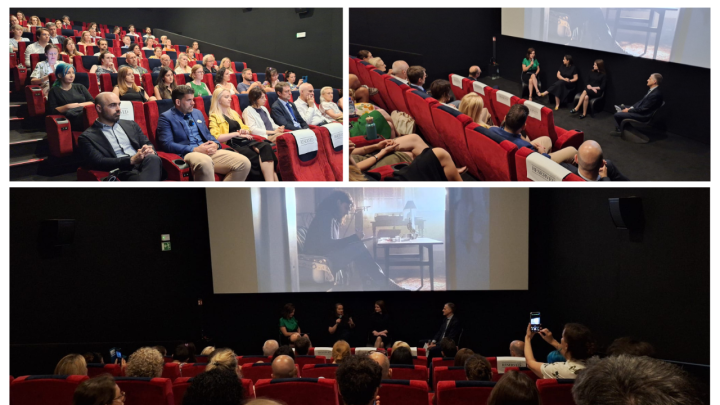MIP participates in Remembering Srebrenica – 30 Years Later in Brussels, hosted by the EEAS
The Mechanism Information Programme for Affected Communities (MIP) participated in the event Resilience and Memory: Srebrenica 30 Years Later, held at BOZAR in Brussels, to commemorate 30 years since the 1995 genocide in Srebrenica. Organized by the European External Action Service (EEAS), the event brought together diplomats, civil society leaders, journalists, academics, and students to honour the victims and reflect on the role of culture, memory, and justice in post-conflict recovery.
The event featured the documentary screening of Samir Mehić Bowie – Letters from Srebrenica, which tells the story of a young rock guitarist from Srebrenica whose passion for music offered a powerful symbol of resilience amid the horrors of war. His story highlighted the enduring human capacity for creativity and dignity in the face of unimaginable loss.
Following the screening, a roundtable discussion moderated by Mr. Andrea Matteo Fontana, Head of Division for Strategic Communication at the EEAS, delved into key themes raised in the film. Panellists included Ms. Amina Sejfić, Project Manager at the Post-Conflict Research Centre, Ms. Lamija Grebo, journalist working for the Balkan Investigative Reporting Network, and Ms. Rada Pejić-Sremac, MIP Coordinator.
The panel opened with personal reflections on Samir’s story and its emotional resonance with their own experiences working on Srebrenica and transitional justice. The discussion evolved into broader reflections on the intergenerational legacy of the genocide, the lived experiences of second-generation survivors, the challenges of rebuilding social trust in Srebrenica today, and the critical role of international support.
The importance of preserving historical memory through personal testimony and cultural expression emerged as a central theme. Panellists explored how music, film, and storytelling can humanise history and counter denial, while fostering empathy across communities. The discussion concluded with a call to sustain education and remembrance efforts to ensure that the lessons of Srebrenica are not forgotten by future generations.
The MIP’s participation in the commemoration formed part of the Programme’s efforts to support projects and events organised by civil society organisations that are active in the field of transitional justice in the region of the former Yugoslavia.
The aim of the MIP is to improve the knowledge and understanding of citizens and communities in the countries of the former Yugoslavia about the crimes committed during the conflicts of the 1990s, based on ICTY and Mechanism cases. The MIP is funded by the European Union.

The Mechanism Information Programme for Affected Communities (MIP) participated in the event Resilience and Memory: Srebrenica 30 Years Later, held at BOZAR in Brussels, to commemorate 30 years since the 1995 genocide in Srebrenica. Organized by the European External Action Service (EEAS), the event brought together diplomats, civil society leaders, journalists, academics, and students to honour the victims and reflect on the role of culture, memory, and justice in post-conflict recovery.
The event featured the documentary screening of Samir Mehić Bowie – Letters from Srebrenica, which tells the story of a young rock guitarist from Srebrenica whose passion for music offered a powerful symbol of resilience amid the horrors of war. His story highlighted the enduring human capacity for creativity and dignity in the face of unimaginable loss.
Following the screening, a roundtable discussion moderated by Mr. Andrea Matteo Fontana, Head of Division for Strategic Communication at the EEAS, delved into key themes raised in the film. Panellists included Ms. Amina Sejfić, Project Manager at the Post-Conflict Research Centre, Ms. Lamija Grebo, journalist working for the Balkan Investigative Reporting Network, and Ms. Rada Pejić-Sremac, MIP Coordinator.
The panel opened with personal reflections on Samir’s story and its emotional resonance with their own experiences working on Srebrenica and transitional justice. The discussion evolved into broader reflections on the intergenerational legacy of the genocide, the lived experiences of second-generation survivors, the challenges of rebuilding social trust in Srebrenica today, and the critical role of international support.
The importance of preserving historical memory through personal testimony and cultural expression emerged as a central theme. Panellists explored how music, film, and storytelling can humanise history and counter denial, while fostering empathy across communities. The discussion concluded with a call to sustain education and remembrance efforts to ensure that the lessons of Srebrenica are not forgotten by future generations.
The MIP’s participation in the commemoration formed part of the Programme’s efforts to support projects and events organised by civil society organisations that are active in the field of transitional justice in the region of the former Yugoslavia.
The aim of the MIP is to improve the knowledge and understanding of citizens and communities in the countries of the former Yugoslavia about the crimes committed during the conflicts of the 1990s, based on ICTY and Mechanism cases. The MIP is funded by the European Union.